Generalized and Particularized____ Implicatures
会话含义理论分析

格赖斯(Herbert Paul Grice1913—1988)
• 美国语言哲学家。曾任教于牛津大学和加利福尼 亚大学伯克利分校。 • 以其在语言哲学方面的研究著称,尤其是对说话 者意义的分析、会话暗示的概念和基于目的语义 学的研究比较突出。
• 主要著作有《意义》(1957)、《逻辑与对话》 (1967、1975)、《预设和会话隐涵》(1981)等。
(5)不确定性(indeterminacy): • 具有单一意义的词语在不同的场合可以产生不同的含 义。 例:John's a machine. “机器”这个词语的会话含义可以是:约翰是冷漠的,或 能干的,或不停地工作,或不会动脑筋,或这些含义都 有,只有依据具体的语境,才能确定话语究竟是哪一种 含义。会话含义具有不确定性,它与各种语义理论通 常假设的稳定不变的意义不相容。
1.会话含义理论的提出
• 会话含义理论(the theory of conversational implicature),由美国哲学家格赖斯(Grice)提出。 • 上世纪50年代初期,格赖斯就有了该理论的初步设想 • 1967年,格赖斯于哈佛大学的William James讲座作 了三次演讲。 • 第二讲《逻辑与会话》(Logic and Conversation)中 提出了“合作原则(cooperative principle)”和“会 话含义”理论。
• (4)故意违反或利用某一准则来传递会话含义。说话人 故意不遵守某一条准则,即说话人知道自己违反了某一 条准则,同时还使听话人知道说话人违反了该条准则, 但目的不是中断交谈,而是为了向听话人传递一种新信 息——会话含义。 • 注:格赖斯讨论的违反第一质量准则的例子都是传统 的修辞格,如反语(irony)、隐喻(metaphor)、 缓叙(meiosis)、夸张(hyperbole)。
implicature

evidence;
• Eg. A:Would you like to come to our party tonight?
• B:I'm afraid that I am not feeling so well tonight.
PrinciHale Waihona Puke le of conversation
• Cooperative principle (CP)--- According to Paul Grice, in making conversation, there is a general principle which all participants are expected to observe. It goes as follows:
Implicature:
• conventional implicature规约含义:based on the conventional meaning of certain words in the language
• eg. He is rich but he is not greedy. • He is rich and he is not greedy. • connectives:so, therefore, yet • eg.He is an Englishman; he is, therefore, brave. • He is an Englishman and he is brave.
“I’m Robert Sampson from Leeds, 28, unmarried…”
8. Implicature (II)
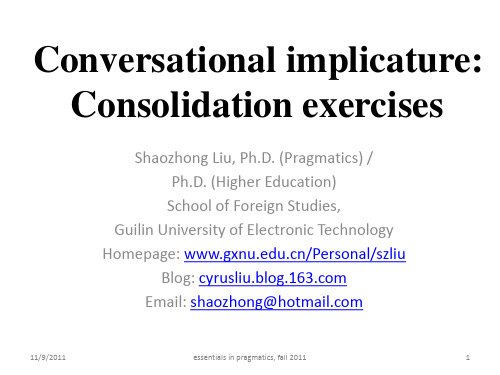
Definite vs. indefinite knowledge
• Articles, possessives, demonstratives, etc. may indicate levels of certainty or definiteness of inference. • Most people may infer the following without more contextual information or effort. E.g.: 1)Carmen: Did you get the milk and the eggs? Dave: I got the milk. Did Dave buy the eggs? (Like in TOEFL listening test!)
11/9/2011
essentials in pragmatics, fall 2011
11/9/2011 essentials in pragmatics, fall 2011 9
Cancelling presuppositions or implicatures
• Cancelling an existential presupposition: Mike: What happened? Annie: Steve’s dog wrecked the garden – and in fact, Steve doesn’t have a dog. • Cancelling a lexical presupposition: Mike: What’s up? Annie: I’ve stopped smoking – although I’ve never smoked.
会话含义与合作原则

会话含义与合作原则美国语言哲学家格赖斯为了保证谈话顺利进行,谈话双方必须共同遵守一些准则,特别是在1967年提出的“合作原则”。
当谈话一方不遵守合作原则而又不是为了说谎为目的即故意违反准则,于是就产生会话含义。
会话含义就是一种超出语句本身意义范围的意义,即说话者的“言外之意”。
一般来说,人们可以通过违反合作原则中的质、量、关系原则和利用方式准则来表达或推导出会话含义,来表达与字面意思不同的没有说出来的含义,回避志杰说出想表达的意思,含蓄的表达自己的真实意图。
会话含义一般可以分为两类:一般含义和特殊含义。
一般含义是指在遵守合作原则中的默想准则是带有的含义。
特殊含义是指在有意违反合作原则中的某项原则,在特定的语境中推导出来的含义。
会话含义的特征可以归纳为:可取消性、不可分离性、可推导性、非规约性和不确定性。
概要:一、会话含义的由来二、合作原则的几项原则:质的原则量的原则关系原则礼貌原则三、会话含义的产生方法:违反质的原则:故意提供不足的信息,提供没有必要的信息违反量的原则:说一些不符合事实的话;说一些荒唐的话违反关系原则利用礼貌原则:使用有歧义的词语:使用不必要的词语;打乱叙述顺序四、会话含义的种类:一般会话含义和特殊会话含义五、会话含义的特点:可取消性、不可分离性、可推导性、非规约性和不确定性关键词:会话含义合作原则违反谈话C onversational Implicature and Cooperative PrincipleAmerican linguistics H.P.Grice once gave in 1967.In the speech, Grice said, the two sides of the conversation must obey some basic rules, especially the “cooperative principle”, to ensure that the conversation can go on propitiously. When one side of the principle doesn’t want to lie, conversational implicature comes out. Conversational implicature is a kind of meaning, which is beyond the sentence itself. Generally speaking, people can violate the maxim of quality, quantity, and relation and use the maxim of the manner to produce conversational implicature, which send the unsaid meaning of the words. Generally speaking, conversational implicature can be divided into two kinds: generalized implicature and particularized implicature. Generalized implcature refers to an implicature, which obeys the cooperative principle and also has the meaning. Particularized implicature refers to the implicature that violates some of the cooperative principle and makes the meaning in some specially context. The features of the conversational implicature: cancelability, no detachability, calculability, non-conventionality and indeterminacy:Key words:Conversational implicature cooperative principle violate conversationC onversational Implicature and Cooperative PrincipleAmerican linguistics H.P.Grice once gave speeches in 1967.In the speech. Grice said, the two sides of the conversation must obey some basic rules, especially the “cooperative principle”,to ensure that the conversation can go on propitiously. He believed the two sides of the conversation should have a same wish: the two sides can understand each other. So both of them obey some cooperative principles to achieve the aim. However, Grice said, not all the people in the conversation obey the rules. Once one side finds the other side not obey the cooperative principle, he will make himself try his best to understand the unsaid meaning in the conversation. So the conversational implicature comes out.As the conversational implicature has a close relationship with the co operational principle, we will introduce the cooperative principle first. In a conversation, the participants must first of all be willing to cooperate;Otherwise, it would not be possible for them to carry on the talk. This general principle is called the cooperative principle.There are four main maxims in the cooperative principle:●The maxim of quality: make your contribution as informative as required(for thecurrent purpose of the exchange);Do not make your contribution more informative than is required.●The maxim of quality: do not say what you believe to be false; do not say that forwhich you back adequate evidence.●The maxim of relation: the words have a relationship with other factors.The maxim of manner: avoid obscurity of expression; avoid ambiguity; be brief (avoid unnecessary prolixity); be orderly.The conversational implicature is a meaning out of the sentence itself; it is the speaker’s meaning under the literal. In the real life, people often violate some principles to sent some dark meaning.The meaning related with the cooperative principle may become by the following ways:First, to violate the maxim of quality1.Offer the deficient information on purpose.E.g.:One farmer meets Sam and says:“Hey, Sam, my horse’s got distemper. What did you give yours hen he had it?”“Turpentine,” grunted Sam.A week later they meet again and the first farmer shouts:“Sam, I gave my horse turpentine like you said and it killed him.”“S o did mine.” nodded Sam.第一位农妇的真正目的不仅是向Sam了解马病用了什么药,而且想了解治疗的结果,但通过对话它实际上只达到了一半的目标。
形式语用学与显义学说 (1)

形式语用学与显义学说——兼谈显谓与汉语配价研究的关系蒋严对隶属语用层面的现象、过程、原则和语境因素作形式化刻画,进而发展出自成体系的形式语用学(formal pragmatics)乃至计算语用学(computational pragmatics)理论框架,这方面的研究是较为新颖的课题,产自语言学界的成果在数量上远不如逻辑和人工智能领域中的类似研究成果。
大部分研究是随着认知科学的发展需要应运而生的,在很大程度上也得益自形式语言学理论和应用逻辑的迅速发展。
当前可以观察到的一些研究方向是:对推理语用学(inferential pragmatics)各派理论的形式化研究;对语境的形式化刻画;话语表达理论(DRT)的研究对象从语义现象朝语用现象的扩展和延伸;优选论(optimality theory)对语用问题的研究;以博弈论(game theory)为基础创建的形式语用理论;从关联逻辑(relevance logic,另译相干逻辑)、决策理论(decision theory)、溯因推理(abductive inference)等逻辑角度提出的理论;应智能交际人(embodied conversational agent)的仿真对话需要而做出的形式语用研究,等等○1。
尽管形式语用学迄今并无明确的范围,也没有公认的研究目标和研究程序,既有的研究成果和文献却已相当可观。
但因现有的研究是在语言学、计算科学、逻辑、人工智能几个不同学科分别开展的,有各自为阵的特殊性,跨学科的对话和兼容性都较少,这种缺憾在发表的文献中也反映了出来。
故此,在现阶段尚难以从既有成果中整合出一套兼收并蓄、为多数从事形式语用工作的学者所共同接受的形式化系统○2。
出于对本书编辑主题方面的考虑,我们无意在此对语用形式化的各种研究作全面述评○3。
我们要讨论的题目相对较狭窄具体,试图通过对源于关联理论(relevance theory)的显义(explicature)这个较为新颖的概念作一番形式上的探讨,得出更为精确的定义,揭示显义及其相关语用过程显谓(explicating)的形式特性,进而考察这些特性对语用学、语言哲学和汉语语法研究所带来的理论后果,为建立全面的形式语用学体系打下基础。
电视剧《欢乐颂1》中会话含义的解读
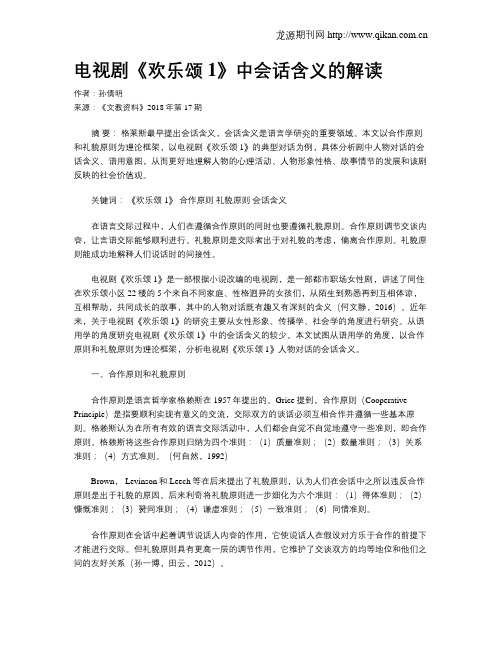
电视剧《欢乐颂1》中会话含义的解读作者:孙倩明来源:《文教资料》2018年第17期摘要:格莱斯最早提出会话含义,会话含义是语言学研究的重要领域。
本文以合作原则和礼貌原则为理论框架,以电视剧《欢乐颂1》的典型对话为例,具体分析剧中人物对话的会话含义、语用意图,从而更好地理解人物的心理活动、人物形象性格、故事情节的发展和该剧反映的社会价值观。
关键词:《欢乐颂1》合作原则礼貌原则会话含义在语言交际过程中,人们在遵循合作原则的同时也要遵循礼貌原则。
合作原则调节交谈内容,让言语交际能够顺利进行。
礼貌原则是交际者出于对礼貌的考虑,偏离合作原则。
礼貌原则能成功地解释人们说话时的间接性。
电视剧《欢乐颂1》是一部根据小说改编的电视剧,是一部都市职场女性剧,讲述了同住在欢乐颂小区22楼的5个来自不同家庭、性格迥异的女孩们,从陌生到熟悉再到互相体谅,互相帮助,共同成长的故事,其中的人物对话既有趣又有深刻的含义(何文静,2016)。
近年来,关于电视剧《欢乐颂1》的研究主要从女性形象、传播学、社会学的角度进行研究。
从语用学的角度研究电视剧《欢乐颂1》中的会话含义的较少。
本文试图从语用学的角度,以合作原则和礼貌原则为理论框架,分析电视剧《欢乐颂1》人物对话的会话含义。
一、合作原则和礼貌原则合作原则是语言哲学家格赖斯在1957年提出的。
Grice提到,合作原则(Cooperative Principle)是指要顺利实现有意义的交流,交际双方的谈话必须互相合作并遵循一些基本原则。
格赖斯认为在所有有效的语言交际活动中,人们都会自觉不自觉地遵守一些准则,即合作原则。
格赖斯将这些合作原则归纳为四个准则:(1)质量准则;(2)数量准则;(3)关系准则;(4)方式准则。
(何自然,1992)Brown, Levinson和Leech等在后来提出了礼貌原则,认为人们在会话中之所以违反合作原则是出于礼貌的原因。
后来利奇将礼貌原则进一步细化为六个准则:(1)得体准则;(2)慷慨准则;(3)赞同准则;(4)谦虚准则;(5)一致准则;(6)同情准则。
特殊会话含义

二者比较
Context 1 A:What time is it? B:Some of the guests are already
leaving. GCl:Not all of the guests are already
leaving. PCI: It mus。
二、会话含义的分类
语境在其推导的过程中所起到的作用不同
1一般会话含意(generalized conversational implicature):相对自由,它可与语境脱离。
许多比喻性的语言产生一般会话含意。比 如,大 部分比喻和习语脱离了语境也能 理解,人们通常把“He spilled the beans”理解为“他泄露了秘密”。 2 特 殊 会 话 含 意 (particularized conversational implicature):依赖于语境。
但在具体交际中,人们会因为某种原因面 违反其准则,这样就产生了会话含意。
合作原则具体体现为4条准则
• 1.量的准则(Quantity Maxim):a.交谈所需 信息。b.交谈不要超出所需信息。
• 2.质的准则(Quality Maxim):a.不故意说假 话。b.不说缺乏足够证据的话。
• 3.关系准则(Relevant Maxim):说话要有关联。 • 4.方式准则(Manner Maxim):讲话要清楚明
特殊会话含义
• 一: • 二:
会话含义的产生 会话含义的分类
一、会话含义的产生
Grice(1975)认为,言语交际的成功是谈话 双方共同努力的结果。
言语交际的成功在于人们遵循了某些规则, 达成了某种契合。这些规则和默契Grice称 为“合作原则”(cooperative principle)
会话含义与礼貌原则

会话含义与礼貌原则摘要:礼貌是交际成功的前提,在交际中起重要作用。
合作是话语参与者都应遵守的原则。
会话含义来源于合作原则,会话含义的产生在交际中与礼貌有密切的联系。
本文首先叙述了会话含义理论,对会话含义中的“归约性”和“非规约性”的概念进行了区分,探讨了合作原则和会话含义之间的关系,其次借助lakoff和leech 的礼貌原则对礼貌这一交际中的语用现象进行了对比,最后探讨了礼貌原则的使用和合作原则违反对会话含义的产生带来的影响。
关键词:礼貌原则合作原则会话含义1.引言会话含义是指说话人话语意思的暗含(implying)及听话人对其所(隐)含意思(what is implied)的理解。
格赖斯(grice)的合作原则(cooperative principle)是会话含义理论的基础。
格赖斯认为,这里合作的概念是:会话参与者尽管是分别提供自己的话语,但总是在一定程度上意识到其中的某一目的,至少是一个相互都能接受的话语发展方向;这一(些)目的或方向的达成是会话参与者在交流过程中共同合作努力的结果。
也可以说是在会话过程中共同维护和坚持当前的目的和方向形成的默契(grice,1975)。
礼貌原则是以说话人为中心的一种社会学原则。
lakoff(1973)认为在某些类型的言语交际中,礼貌因素在决定会话的有效性上占上风。
lakoff(1973)指出礼貌受三条规则支配:不要强加;给予人选择的机会;友好相待。
lakoff(1977)提出了“语用能力”两条原则:清楚和礼貌,她认为其中的清楚原则主要针对信息,大致等于grice的“合作原则”。
礼貌原则由以下三个规则构成:(1)拘泥性:不要强加,保持距离;(2)犹豫,给听者选择;(3)平等或同志般的友情。
笔者从格赖斯的会话含义角度对礼貌原则及礼貌的使用进行分析,论述合作原则与礼貌原则之间存在的必然联系。
2.会话含义会话含义(conversational implicature)最初是美国语言哲学家格赖斯于1967年提出来的。
语用学_外语学习-翻译基础知识

第七章语用学•美国哲学家C.Morris(1946)把符号学分成三大部分:•句法学---研究语言符号和符号之间的关系;•语义学---研究语言符号和世界对应体之间的关系;•语用学---(pragmatics)研究语言符号和符号使用者之间的关系。
•此前,逻辑学家R.Carnap(1938)认为语用学探讨的是“人生成和理解语言符号的行为、状态和场合”上,使得部分分析哲学家、语言学家、人类学家、社会学家、心理学家消极地把语用学定义成应付“语义学无法处理的内容”的学科,语用学便似乎成了什么都可以往里扔的“废纸篓”了。
•我们认为,语用学探讨的是符号产生交际意图的规律,词语意义和语境结合可以产生语用意义,因此语用学所探讨的对象,应该是语用者解码和推理的规律,即把符号和语境结合,通过推理去理解说话人意图的过程。
•研究类似规律的语用学理论包括:•(1)言语行为的适宜条件(felicity conditions.J.Austin1962,J.Searle1969),•(2)会话公设(conversational postulates.D.Gordan&koff1975),•(3)善行原则(principle of charity.D.Davidson1972, 1980),•(4)合作原则和会话准则(cooperative principle and conversational maxims.P.Grice1975),•(5)理性原则(principle of rationality.A.Kasher1976),•(6)悲观互动策略(strategy of interactional pessimism.W.Labov&D.Fanshel1977,S.Levinson1983),•(7)透明原则(principle of transparency.M.Dascal1983),•(8)礼貌原则(politeness principle.G.Leech1983,P.Brown &S.Levinson1987),•(9)关联原则(principle of relevance.D.Sperber&D.Wilson1986)等。
Pragmatics6---Implicature

(b) Tom: Where's the salad dressing? Gabriela: We've run out of olive oil. (There isn't any salad dressing')
Comment
•
From a semantic point of view, because all logically entails some. Sieve's response in (a) is technically true. The same kind of logic applies to (b)-(d) as well. However, from a pragmatic point of view. Steve's utterances have certainly misled Jane because of the implicatures that people normally draw in these circumstances. Steve's trickery involved what we call scalar implicatures Scale Scale Scale Scale of of of of quantity: some most all frequency: sometimes often always coldness: cool cold freezing likelihood: possibly probably certainly
考研英语词汇复习(35):conclude、judge、generalize、summarize
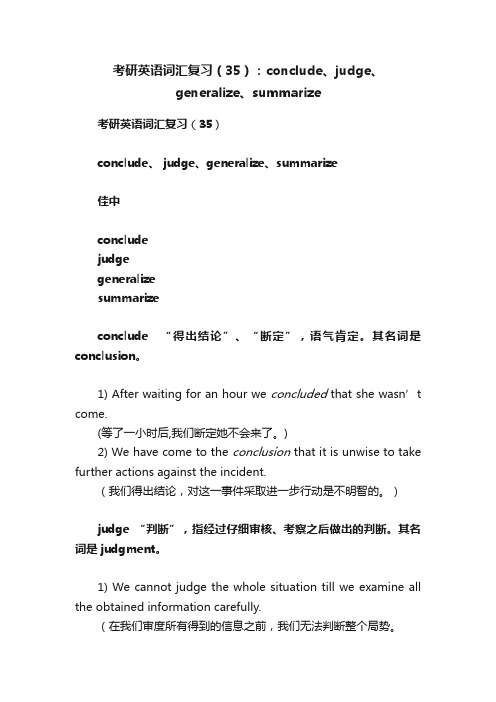
考研英语词汇复习(35):conclude、judge、generalize、summarize考研英语词汇复习(35)conclude、 judge、generalize、summarize佳中concludejudgegeneralizesummarizeconclude “得出结论”、“断定”,语气肯定。
其名词是conclusion。
1) After waiting for an hour we concluded that she wasn’t come.(等了一小时后,我们断定她不会来了。
)2) We have come to the conclusion that it is unwise to take further actions against the incident.(我们得出结论,对这一事件采取进一步行动是不明智的。
)judge “判断”,指经过仔细审核、考察之后做出的判断。
其名词是judgment。
1) We cannot judge the whole situation till we examine all the obtained information carefully.(在我们审度所有得到的信息之前,我们无法判断整个局势。
2) If a man is easily taken in by emotional traps, he will certainly not be able to make sensible judgment.(如果一个人很容易被情感陷阱欺骗,他肯定不能做出明智的判断。
)generalize “判断”、“概括”,“归纳”,指对……进行概括,从……笼统地概括出一般的或的规律。
或作一般性的结论。
1) You cannot generalize about the effect of the drug from one or two cases.(你不能从一两个病例来断药物的效果。
格赖斯会话含义理论与语用推理
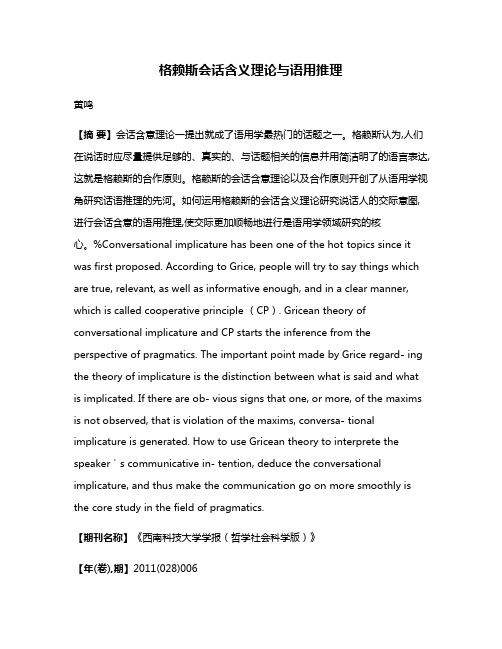
格赖斯会话含义理论与语用推理黄鸣【摘要】会话含意理论一提出就成了语用学最热门的话题之一。
格赖斯认为,人们在说话时应尽量提供足够的、真实的、与话题相关的信息并用简洁明了的语言表达,这就是格赖斯的合作原则。
格赖斯的会话含意理论以及合作原则开创了从语用学视角研究话语推理的先河。
如何运用格赖斯的会话含义理论研究说话人的交际意图,进行会话含意的语用推理,使交际更加顺畅地进行是语用学领域研究的核心。
%Conversational implicature has been one of the hot topics since it was first proposed. According to Grice, people will try to say things which are true, relevant, as well as informative enough, and in a clear manner, which is called cooperative principle (CP). Gricean theory of conversational implicature and CP starts the inference from the perspective of pragmatics. The important point made by Grice regard- ing the theory of implicature is the distinction between what is said and what is implicated. If there are ob- vious signs that one, or more, of the maxims is not observed, that is violation of the maxims, conversa- tional implicature is generated. How to use Gricean theory to interprete the speaker's communicative in- tention, deduce the conversational implicature, and thus make the communication go on more smoothly is the core study in the field of pragmatics.【期刊名称】《西南科技大学学报(哲学社会科学版)》【年(卷),期】2011(028)006【总页数】5页(P31-35)【关键词】会话含意;合作原则;语用推理【作者】黄鸣【作者单位】成都大学外国语学院,四川成都610106【正文语种】中文【中图分类】H030美国哲学家格赖斯(H.P.Grice)在1957年发表的《意义》一文中把意义分为两类:“自然意义”(natural meaning)和“非自然意义”(non-natural meaning)。
语用学2
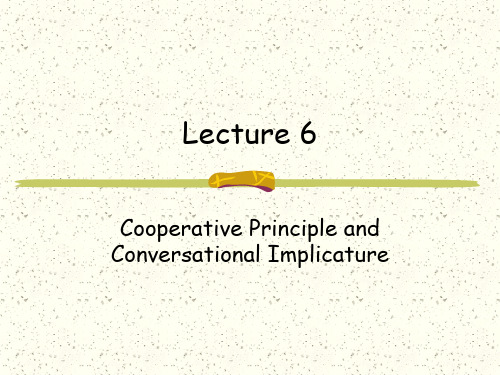
What is Grice aiming at?
An outline of a systematic theory of language use which tries to bridge the gap between the truth-conditional interpretation of expressions (along the lines of a formal logic) and the wider meaning (what is said + what is implicated) which they take on in everyday conversation Through the conversational maxims and principle and the mechanisms with which can trigger conversational implicatures.
Lecture 6
Cooperative Principle and Conversational Implicature
人们在交际时是否遵循一定的原则?语 言学家是如何定义这些原则的? 人们在谈话中通常是如何表达自己的意 图的?
Contents
Conversational Implicature (CI)
Implicature and inference
By implicature, we mean what is implied. And by conversational implicature, we mean a meaning or message that is implicated in a conversation.
[英语学习]06Chapter 6_pragmatics
![[英语学习]06Chapter 6_pragmatics](https://img.taocdn.com/s3/m/17182999fd0a79563c1e72fb.png)
Morphology Syntax
1.1 Origin of Pragmatics
Pragmatics is a relatively new branch of linguistics.
Pragmatics was put forward as early as
1938 in the book Foundation of the Theory of Signs by Charles Morris
It’s cold here.
Contextual Meaning: meaning in context
The meaning of the sentence depends on who the speaker is , who the hearer is, when and where it is used.
3. Speech Act Theory
John Austin
How to Do Things with Words (1962)
3.1. Constatives vs. performatives Constatives: utterances which roughly serves
E.g. 1. You called at 9:00 last night? I was out then. 2. ---The party starts at 6:00 Friday evening. ---Okay, I’ll see you then.
2.4 Discourse Deixis
utterance meaning, & contextual meaning.
Speaker’s meaning (A father is trying to get his 3-year-old daughter to stop lifting up her dress to display her new underwear to the assemble.)
Chapter 3 Conversational__ Implicature

Types of implicature
meaning-nn what is said what is implicated
conventionally
generalized
conversationally
particularized
Huang1994, 2009:57 Davis 1998
Those spot meant measles. Those spot meant measles, but he hadn‟t got measles. (Semantically anomalous) 格赖斯指出自然意义和非自然意义的区别可用逻辑 方法把握。 当x means p表达的是自然意义时, x means p为真, p就为真,它们之间有一种逻辑蕴含关系。
Levinson(1983:128-129)认为 “however, moreover, besides, anyway”等起连接作用的词, “sir, madam, mate, your honour”等称呼语 都有常规意义。
Characteristics/properties of conventional implicature: 与会话含义相同的特点: 不是真值条件意义,不是明说的一部分。 与会话含义完全不同的特点: 1. 常规含义不具备可取消性(non-cancelability); 2. 常规含义是可分离的(detachability); 3. 常规含义是确定性的(determinacy); 4. 常规含义不需要推导(non-caculability); 5. 常规含义是规约性的(conventionality)。
The essence of meaningnn is that it is communication which is intended to be recognized as having been intended. Meaningnn is a matter of expressing and recognizing intention.
Conversational Implicature 会话含义

Because language is basically culture-specific, conventional implicature of the same expression may vary under different cultural background.
For example, ‘white’ gives the implicature of purity and
B’s implicature:
Sorry, I don’t know the exact time of the present moment, but I can provide some information from which you may be able to deduce the appropriate time, namely ‘the milkman has come’.
Semantic and literal meaning: his answer unrelated to the question.
Intended meaning: the football match will be canceled as the ground is wet and slippery after the rain.
U →由语言符号构成的话语
Z →粗略地代表在听话人那儿产生的信仰或意志力, 或作出的反应。 Grice 的“非自然意义理论”实际上是一种交际理论 ( a theory of communication)。
2.2 Conversational Implicature Unlike conventional implicatures, conversational implicatures are produced by relating to the conversational context. To know what people mean, we have to interpret what they say. But interpretation is a tricky affair, and misunderstandings are always possible. As Leech remarks, ‘interpreting an utterance is ultimately a matter of guesswork’. e.g. A: When is Tom’s birthday? B: It’s sometime in October. B’s implicature: the only thing he remembered about Tom’s birthday was the month in which it occurs, and that he honestly didn’t know whether it was at the beginning, the middle or the end of that month.
再议规约含义与会话含义的差异与共性

再议规约含义与会话含义的差异与共性王晓俊【摘要】含义是话语中传达出不同于命题意义的内容,从语境及语言形式出发,可分为规约含义和会话含义.规约含义附着于特定的语言形式,并以“所言者介入”为实现条件,显示出附着性和规约性的特征.会话栖息于交际双方的语境,不同或临时性的会话含义产生于不断变化的语境中,具有语境依赖性、语境共识性、语义动态性等本质属性.【期刊名称】《河南工程学院学报(社会科学版)》【年(卷),期】2014(029)001【总页数】7页(P65-71)【关键词】规约含义;会话含义;差异;共性【作者】王晓俊【作者单位】河南工程学院外语学院,河南郑州451191【正文语种】中文【中图分类】H030一、引言Grice将语言意义解读为一组立体集合,其中包括所言(What is said)和含义(What is implicated),其形式化的表达式为“说话人说X时表达了P”(X表示句子,P表示说话人表达的意义)。
[1-2]后来,Gazdar为了能够更好地解释Grice的“含义”本质,运用了一个更简洁的公式表示:What is meant- What is said = What is implicated。
[3]Grice的含义框架可分为规约含义(conventional implicature)和会话含义(conversational implicature)的一对对应组合。
由于Grice在界定规约含义时语焉不详,所以使得后来的研究者们很少关注这一问题,而关乎规约含义的文献也相当有限。
Kempson认为,规约含义是一个没有价值的概念,曾提出要把Grice的“规约含义”分门别类到会话含义、语义预设(presupposition)和逻辑蕴含(entailment)范围内进行分别处理的建议。
[4]Levinson在理解自然语言中,承认规约含义的存在性,并把它看作语言启动后的半影(penumbra)。
- 1、下载文档前请自行甄别文档内容的完整性,平台不提供额外的编辑、内容补充、找答案等附加服务。
- 2、"仅部分预览"的文档,不可在线预览部分如存在完整性等问题,可反馈申请退款(可完整预览的文档不适用该条件!)。
- 3、如文档侵犯您的权益,请联系客服反馈,我们会尽快为您处理(人工客服工作时间:9:00-18:30)。
ห้องสมุดไป่ตู้
In certain contexts, if one expression has given rise to the conversational implicature, then no matter what other synonymous forms are used, the implicature will be shared by all these synonymous forms.
Special Features of Implicatures
Cancellability
They
can be cancelled by adding one more clause to them. It may be contextually cancelled, if the form of utterance that usually carries it is used in a context that makes it clear that the speaker is opting out.
With “the literal meaning or the sense of the utterance on the one hand, and the Cooperative Principle and the maxims on the other, it follows that an addressee would make the inference in question to preserve the assumption of cooperation.”
The
literal meaning remains the same in all contexts, but conversational implicatures will vary or be lost as the context changes.
Indeterminacy
This
refers to the fact that an expression with a single meaning can produce different implicatures as the contexts and participants vary.
Conventional implicatures
Generalized and Particularized Implicatures
Generally, conversational implicatures can be divided into two kinds: Generalized and Particularized.
Exercise1 For each dialogue, answer the accompanying question based on the implicature that you can draw from the second speaker's response. Think about why you drew those implicatures.
3.
The context. This may include time, place, people, attitude and evaluation of the world. 4. The mutual understanding of the participants, what has been said and what is expected to follow. 5. All these things must be accessible to the participants in the conversation.
Scalar implicatures
Jane: Who used all the printer paper? Steve: I used some of it. Jane: I hear you're always late with the rent. Steve: Well, sometimes I am
Calculability
This
means that for every conversational implicature, it is possible to make an argument like that given by Grice in the earlier discussion on the process of generating implicature.
The following is a set of factors which have to be analyzed if we want to work out the implicature:
1.
The conventional meaning of the utterance, i.e., the propositional content. This is the first step, for , if we don’t know what these meanings are, the utterance is only a series of sounds not much different from the sounds in nature. 2. The Cooperative Principle and submaxims.
Scale of quantity: some most all Scale of frequency: sometimes often always Scale of coldness: cool cold freezing Scale of likelihood: possibly probably certainly
Particularized Implicatures
These
implicatures are generated in a conversation by overtly and deliberately violating some submaxims for communicative purposes. They are inferences dependent on particular time, place, and people. The speaker in this situation follows the general Cooperative Principle, but he violates some submaxims.
Non-detachability
Conversational implicatures are generated from the semantic content by assuming the Cooperative Principle. So they are attached to the content rather than to the form, or in other words, it is not possible to get rid of the implicatures by substituting words with synonyms.
The speaker has said something P, by considering the present situation the hearer cannot find any reason to treat the speaker as being uncooperative or not following the general principle; the speaker cannot be thought of as being so unless he actually means something Q. The speaker knows that the hearer is aware that the supposition that the speaker actually means Q is required; the speaker intends the hearer to think Q as well, or at least the speaker is willing to allow the hearer to think Q. So the speaker, by producing the utterance
1. Carmen: Did you get the milk and the eggs? Dave: I got the milk. Did Dave buy the eggs'? 2. Faye: I hear you've invited Mat and Chris. Ed: I didn't invite Mat. Did Ed invite Chris?
Generalized Implicatures
Generalized
implicature is obtained by assuming that the speaker is observing the conversational maxims and his uttering of the prior sentence will generally carry some implicatures.
We normally assume (following the co-operative principle) that, where speakers have a scale of values at their disposal, they will choose the one that is truthful (maxim of quality) and optimally informative (maxim of quantity). So, we normally draw the implicature 'not any of the higher values on the scale'.
